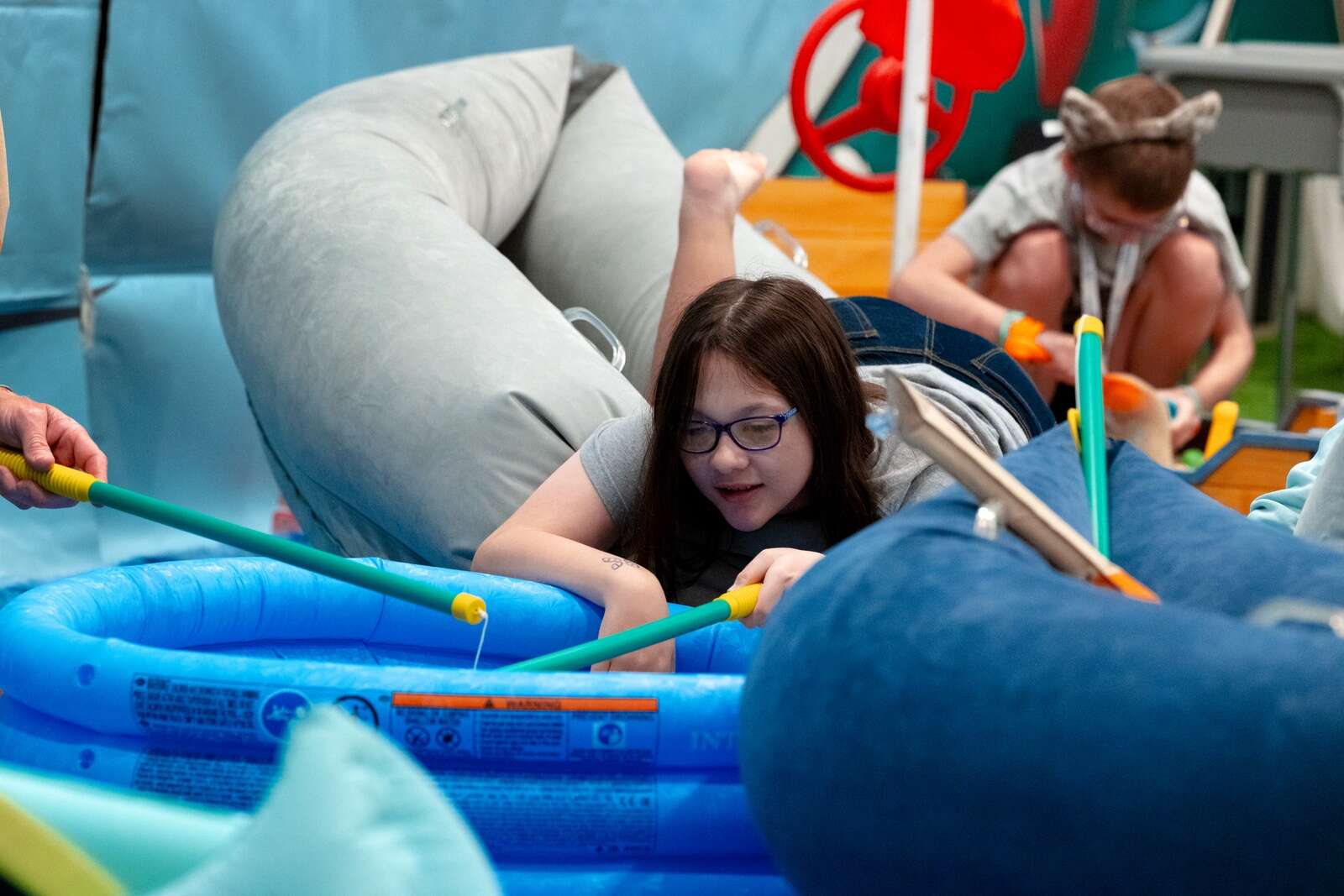Kaylee Raia, left, and her mom, Carrie, center, work on a craft project at Camp Small Steps in Gurnee. Kaylee lives with Dravet syndrome, a rare and severe form of epilepsy.
Courtesy of UCB and Dravet Syndrome Foundation
Most parents worry about scraped knees, tumbles on the playground or gym class injuries.
But for the Raia and Tisdale families, their everyday fears are life-threatening: a seizure that can strike their children at any time, set off by something as simple as a change in temperature.
Living with Dravet syndrome means being on constant watch, never knowing when the next call to 911 might come. The disorder is rare, affecting about one in every 15,700 children born in the United States.
Carrie Raia of Barrington remembers those first frightening months with her daughter, Kaylee. Kaylee was just 9 months old when genetic testing confirmed Dravet syndrome, a rare and severe form of epilepsy.
“We went from having a typical 2-year-old to calling 911 every week,” Raia said. “Her seizures wouldn’t stop, and every trip to the hospital felt like her life was on the line.”
Brenda Tisdale of Homewood tells a similar story about her daughter, Addison, now 14. “I had never seen a seizure in my life, and suddenly my 7-month-old was rigid in her car seat while I was calling 911,” she said.
Doctors first told her it was just a febrile seizure, but the episodes kept coming. “Getting that diagnosis over the phone was devastating,” Tisdale said. “I was writing things down, Googling, and realizing life would never be the same.”
Addison Tisdale of Homewood plays at Camp Small Steps, recently held at Great Wolf Lodge in Gurnee. Addison, 14, lives with Dravet syndrome, a rare and severe form of epilepsy.
Courtesy of UCB and Dravet Syndrome Foundation
A different kind of epilepsy
Unlike more common forms of epilepsy, Dravet brings frequent, prolonged seizures that are hard to control with standard medicines. Children often face developmental delays, speech and motor challenges, sleep issues and even difficulties regulating body temperature or heart rate.
Children with Dravet face a higher risk of sudden death.
“It’s not just about the seizures, it’s about your entire picture of life being rewritten,” Raia said.
Kaylee, now a teenager, is verbal and full of personality, but the effects of seizures and powerful medications have slowed her cognitive development. At school, she has always required a one-to-one nurse or assistant by her side.
“Sometimes people assume it’s just about managing seizures, but it’s so much more than that,” Carrie Raia said. “It’s living with uncertainty every day and trying to give your child a full life in the middle of it.”
Tisdale said Addison is spunky and determined, though she functions at a much younger developmental level and needs constant supervision. “With Dravet, something as simple as getting too hot or too cold can trigger a seizure,” she said. “You live in constant watchfulness.”
Finding community
The relentless nature of Dravet can be isolating, which is why programs like Camp Small Steps matter so much.
Created by UCB and the Dravet Syndrome Foundation, the camp, recently held in Gurnee, is designed to let kids with Dravet enjoy activities in a safe, sensory-friendly environment. Crafts, music, fishing games, sand play and a campfire singalong are all adapted to avoid overstimulation that might trigger seizures. Siblings are welcomed as “counselors-in-training” and given special kits to remind them of their importance.
“Camp Small Steps is so much more than a donation or awareness initiative,” said Jason Joseph, head of U.S. Rare Syndromes at UCB. “It’s a support infrastructure built with and for the Dravet community — a space of belonging and memories that last far beyond the experience. It’s hard to put into words the feeling you get when you see these kids getting the chance to just be kids, but it’s a feeling that stays with you.”
For the Raia family, camp provided exactly that. “At Camp Small Steps, for once, we didn’t have to explain Kaylee,” Carrie Raia said. “Everyone just understood. It was the first time in a long time we could breathe and feel normal as a family.”
Her older son, Connor, 17, also found his place there as a sibling volunteer. “That meant so much, because Dravet affects the whole family, not just the child who has it,” she said.
Holding on to hope
Despite the challenges, both families focus on what they call “inchstones” — small victories that others might overlook.
“Every inchstone Addison reaches, no matter how small, reminds us she’s moving forward,” Tisdale said. “We celebrate those victories.”
Raia shares the same outlook. “We don’t know what tomorrow will bring, but we focus on today — the good moments, the little wins,” she said. “That’s what keeps us going.”
Brenda Tisdale of Homewood at Camp Small Steps held at Great Wolf Lodge in Gurnee.
Courtesy of UCB and Dravet Syndrome Foundation
Created by UCB and the Dravet Syndrome Foundation, Camp Small Steps is designed to let kids with Dravet syndrome, a rare form of childhood epilepsy, enjoy camp-style activities.
Courtesy of UCB and Dravet Syndrome Foundation

Gerald Steele is the founder of Stonegate Health Rehab. He shares expert insights, recovery tips, and rehab resources to support individuals on their journey to wellness.
